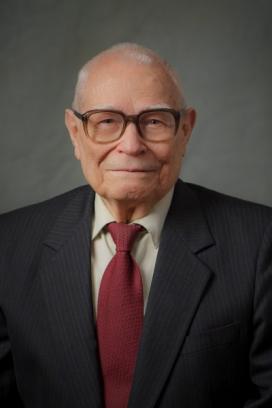In memoriam: Alexis Ostapenko took the most pride in students’ successes
Alexis Ostapenko, a professor emeritus of structural engineering whose career at Lehigh spanned four decades, died on Sept. 26 at the age of 92.
His colleagues admired Ostapenko—or “Dr. O” as many affectionately called him—equally for his immense intellect and warm spirit. He joined the faculty in the department of civil and environmental engineering in 1957, following his dissertation defense at MIT, and retired as an active faculty member in 1994, though he continued mentoring graduate students for several years and maintained an office in Fritz Laboratory into his 90s.
He primarily investigated the stability and strength of plate and box girders on bridges, ship structures, and offshore drilling platforms, as well as the causes of tanker explosions. He won many awards and was published dozens of times over the course of his career, but when asked in 2013 what he was most proud of professionally, he responded, “I am most proud of my students’ accomplishments and the way they progressed in their positions and found success in their fields.”
One of those students is Paul Wiedorn ’83, ’85G. While pursuing his master’s degree, he worked with Ostapenko on a project related to the interactive design of steel box girders. Wiedorn says the practice is commonplace now, but at the time, it was very cutting edge.
“He was a tough advisor in the sense that he expected you to work as hard as he did,” Wiedorn remembers. “But I also always had the sense with Dr. Ostapenko that there was real enjoyment in learning new things, both about people and with technical subjects.”
Wiedorn also remembers spending time with Ostapenko in 1984 when they were experimenting with the internet in its earliest form. “At the time, it was mostly connections between a limited number of university networks—well before the World Wide Web,” he says. “Everything was text based—there were no Web addresses, just IP addresses—so I did not see any particular importance to the technology. But he did. He was very excited about the possibilities.”
John W. Fisher, professor emeritus of structural engineering, also fondly remembers his colleague’s endearing, one-of-a-kind personality.
“Alex walked everywhere,” Fisher says. “Fritz Lab is seven stories tall, but he refused to take the elevator. As a result, he was in the best shape of anyone in the department by a significant margin.”
Ostapenko was also prodigious when it came to learning new languages, Fisher remembers. Born in Ukraine, he received his early engineering education in Germany before coming to the United States. He taught himself even more languages as a professor at Lehigh in order to better interact with the civil and environmental engineering department’s graduate students from Japan, China and other countries. In all, he spoke seven languages with varying degrees of fluency and dabbled in many others.
He is survived by his wife of 58 years, Irene Ostapenko, and by three children and four grandchildren.
A memorial event at Lehigh will be held in the near future. Details will be posted to the CEE department website when they become available.
Gifts in Ostapenko’s memory may be made to the Alexis Ostapenko Endowed Fellowship, Lehigh University, 27 Memorial Dr. West, Bethlehem, PA 18015.
Story by John Gilpatrick ’10
Posted on:





